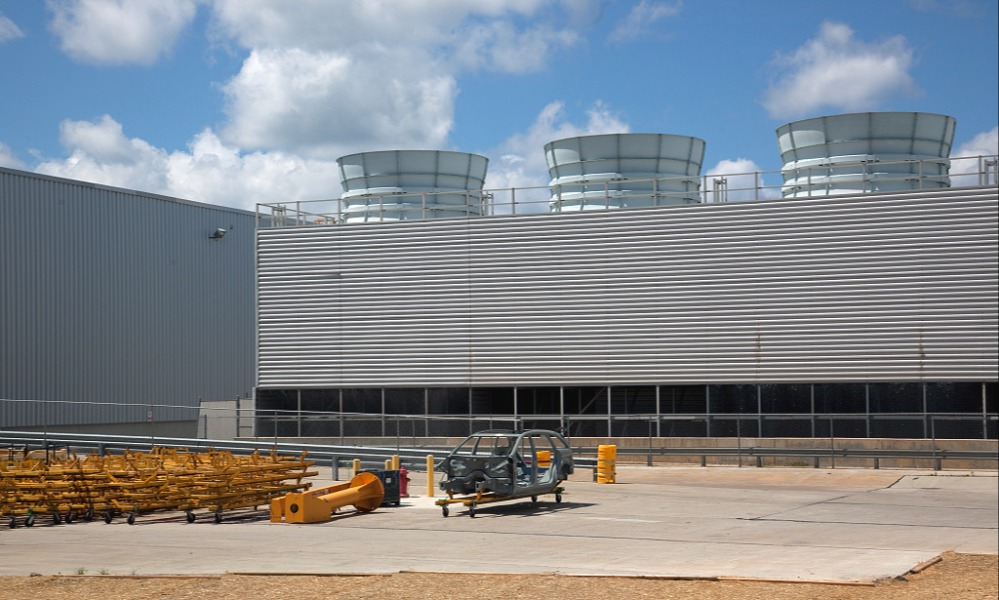How Trump Can Understand the Dangers We Face in the "Age of Consequences"
The Climate Security Act of 2007 was introduced by Senator Joe Lieberman and Senator John Warner, both members of the Senate Armed Services Committee keenly aware of the dangers that climate change poses to our national security and military readiness.

Published by The Lawfare Institute
in Cooperation With

The Climate Security Act of 2007 was introduced by Senator Joe Lieberman and Senator John Warner, both members of the Senate Armed Services Committee keenly aware of the dangers that climate change poses to our national security and military readiness. The bill was ultimately killed after fierce opposition from Republicans on the Senate floor, a lukewarm reception by environmental activists, and a Statement of Administration Policy by the Bush administration threatening to veto the bill made it impossible to move forward.
Senator Elizabeth Dole, who was also a member of the Senate Armed Services Committee at the time and worked with Lieberman and Warner to write the bill, gave a speech on the Senate floor in 2008 arguing in favor of the Act. She stated, “I understand this bill is viewed by as an environmental bill—which it is—but it is also essential to our national security.” Later in her speech, Dole spoke this memorable phrase: “We are now in the age of consequences.”
It is Dole’s voice that begins the narration of the aptly named film The Age of Consequences, which was pre-screened at the Hoover Institution at Stanford University on February 22nd, and will have its debut screening at the Environmental Film Festival in Washington, D.C., which starts today. Written and filmed by Jared Scott and Sophie Robinson from PF Pictures, in conjunction with the Climate and Security Advisory Group at the Center for Climate and Security, the American Security Project, and the Truman National Security Project, the Age of Consequences is a well-produced, gripping, and wide-ranging tour de force. It warns of our lack of military readiness and of multiple national security disasters on the horizon if we do not act to prevent climate change.
As many readers of Lawfare know, there is nothing new about the idea that climate change is a national security issue (see here, here, here, and here). Rather than presenting climate change and national security as a new concept, the Age of Consequences expertly traces headline-making issues like terrorism, the migration crisis, state failure and collapse, and energy dependence to their roots in climate change, weaving together otherwise disparate topics into a single narrative that is told by national security, military, and academic experts in a way that is easy to understand and designed to evoke a visceral audience reaction. A powerful documentary on the wide-ranging and frightening impacts of climate change has not been made on this scale since Al Gore’s “Inconvenient Truth,” and the filmmakers consciously seek to emulate that example, with a laser-like focus on the national and international security challenges climate change presents.
The film also manages to tease out in greater detail national security implications of climate change that have only received scant attention from the wider public.
For example, China is ready to lead on climate change both economically and geopolitically. China plans to spend more than $360 million through 2020 on renewable power sources like solar and wind, and its rush to leverage its resources and manpower in the clean energy market along with powerhouse economies like India and South Africa threatens to shut the United States out from leadership in a new and innovative industry. Yale professor Timothy Snyder also explains in the film that China tends to “panic” buy commodities like wheat to guard against shortages from other sources, and hypothesizes that as shortages become more frequent, China may lease entire tracts of land from countries with lush farmlands in Africa to maintain security. This would leave China legally in control of large swaths of territory across the globe.
Climate change is already changing the geopolitical map in other ways. The Age of Consequences highlights how melting ice in the Arctic has opened an entirely new ocean to potential conflict due to unsettled legal questions of territorial ownership.
Under the U.N. Convention on the Law of the Sea (UNCLOS), a nation may claim resources that are part of its continental shelf, or the area 200-350 nautical miles out from its measured baseline. Russia went so far as to plant its flag under the ice of the North Pole with two submersibles in 2007, claiming nearly half the Arctic as its territory even after the U.N. Commission rejected its claim. Russia is also moving massive military resources into the area and even revealed a new Arctic command recently. It presented a revised claim to the U.N. Commission last year, as did Canada, Norway, and Denmark. Many of these claims overlap, causing a great deal of uncertainty. And while Secretary of State Tillerson has familiarity with the region due to his project at ExxonMobil to drill for oil in conjunction with Russia, and Defense Secretary James Mattis focused attention on the Arctic in his confirmation hearings, diverting U.S. military and diplomatic resources to the area may be a bit of a challenge.
Melting ice caps also present the problem of rising sea levels, which affect American naval installations. Norfolk Naval Base in Norfolk, Virginia is the biggest naval base in the world, the headquarters of the U.S. Atlantic Fleet, and home to nearly 75,000 sailors and civilian employees. Senator Tim Kaine (D-VA), the former 2016 Democratic vice presidential nominee who is also briefly featured in the Age of Consequences, has been outspoken on the issue of climate change and its threat to the Norfolk naval base. In a speech on the Senate floor shortly before become Hillary Clinton’s running mate, Kaine stated:
Norfolk and the surrounding communities is the largest concentration of naval power in the world, it’s the center of American naval operations, the headquarters of the U.S. Atlantic Fleet. And it’s already having to spend millions of dollars to elevate the piers where aircraft carriers come and go due to sea level rise.
Indeed, three years ago the ocean was at the top of the sea wall that had held the water back for nearly 100 years. And in addition to the Norfolk Naval Base, there are 29 other military bases, shipyards, and installations in the area that also need to be protected, including a NASA flight facility.
The Age of Consequences makes the point very clearly that these challenges present countries with a choice: take the initiative and resolutely handle climate change as a collective, or do nothing and watch current challenges be made worse. The film takes on special poignancy now, as I recently highlighted on Lawfare, given Trump’s actions since taking office inspire little optimism that anything will be done to combat climate change.
Most recently, President Donald Trump, has signed an executive order that directs a review the “Waters of the United States,” rule, which gives the EPA jurisdiction to keep waters across America clean, with an eye towards “rescinding or revising,” the rule. Trump has also proposed a budget which would slash by 17% the funding of the National Oceanic and Atmospheric Association (NOAA), which provides the most accurate climate science data available to the United States government and the governments of other countries, as well as plans for weather resilience, specifically on the coasts. Such a cut could cripple the NOAA, and leave the United States without a clear vision of how severe the consequences of climate change could become.
Trump’s proposed increase in military spending seeks to put into action his claim that as president, he has “no higher duty than to protect the lives of the American people.” But the budget works to the opposite effect if implemented, leaving the government in the dark and bereft of a full picture of the harmful impacts of a changing climate.
Michael Breen, the president and CEO of the Truman National Security Project, bluntly sums up the necessary path forward near the close of the Age of Consequences: “If 99% of my intelligence told me that there’s an ambush waiting for me, I don’t get to say, yeah, but there’s that 1% that says there’s no ambush, so to hell with the other 99%. That’s negligence on an unfathomable scale.”
Trump reportedly has a thing for TV over lengthy briefings and policy papers. Perhaps if he watched this one, he could be persuaded to take action. One place to start is a suggestion made by Rear Admiral David Titley (ret.) in the film, prodding Congress towards legislation that comprehensively deals with the security issue of climate change: “Congress won’t lead on this issue, but it can be led.”





